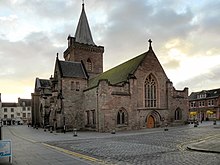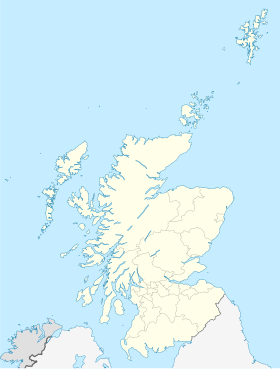Cities of Scotland
Scotland has eight cities. Edinburgh is the capital city and Glasgow is the most populous. Scottish towns were granted burghs or royal burgh status by Scottish kings, including by David I of Scotland and William the Lion.
City status has later been granted by royal charter and letters patent. Scotland has gained new cities since the year 2000 via submitted bids to be awarded city status as part of jubilees of the reigning British monarch or for other events, such as the millennium celebrations. Dunfermline is the latest to be awarded city status.
List of Scottish cities
[edit]| Name in English[1] | Name in Scottish Gaelic | Nickname[1] | Council area | Year granted or confirmed | Recognition of Church by King or bishopric established | Population[1] |
|---|---|---|---|---|---|---|
| Edinburgh | Dùn Èideann | Auld Reekie | City of Edinburgh |
|

|
495,360 |
| Perth | Peairt | The Fair City | Perth and Kinross | 
|
50,000 | |
| Aberdeen | Obar Dheathain | The Granite City | Aberdeen City | 
|
197,000 | |
| Inverness | Inbhir Nis | The Capital of the Highlands | Highland | 
|
47,000 | |
| Stirling | Sruighlea | Gateway to the Highlands | Stirling |
|

|
37,000 |
| Dunfermline | Dùn Phàrlain | The Ancient Capital | Fife | 
|
54,990 | |
| Glasgow | Glaschu | Dear Green Place | Glasgow City | 
|
598,830 | |
| Dundee | Dùn Dè | City of Discovery | Dundee City | 
Dundee Parish Church (St Mary's)
|
150,000 |
Population and population density
[edit]| City | Population (locality)(2022)[34] | Population (settlement)(2022)[34] | Locality area km2[35] | Settlement area km2[36] | Density (locality) per km2 | Density (settlement) per km2 |
|---|---|---|---|---|---|---|
| Glasgow |
632,350 |
1,028,220 |
147 | 274 | 4300 | 3750 |
| Edinburgh |
506,520 |
530,990 |
119 | 126 | 4260 | 4210 |
| Aberdeen |
198,590 |
220,690 |
60.7 | 75.6 | 3270 | 2920 |
| Dundee |
148,210 |
158,820 |
46.5 | 50.2 | 3190 | 3160 |
| Dunfermline |
54,990 |
76,210 |
19.9 | 28.8 | 2760 | 2650 |
| Inverness |
47,790 |
63,730 |
24.3 | 31.3 | 1970 | 2040 |
| Perth |
47,350 |
47,350 |
17.5 | 17.5 | 2710 | 2710 |
| Stirling |
37,910 |
49,950 |
16.3 | 20.9 | 2330 | 2390 |
Capital
[edit]Forteviot
[edit]
The annals of Ulster cite Forteviot as the residence of Pictish kings Causantín mac Fergusa and Kenneth MacAlpin and that upon the destruction of Forteviot by the Danes, the Picts took residence across the river Tay, establishing Scone as a more defensible royal city.[37]
Scone
[edit]Causantín mac Áeda, King of Scots held the first recorded council at Scone in 906.[38] Malcolm IV of Scotland in a charter to the monastery of Scone states it was founded "in principali sede regni nostri".[39] Alexander III of Scotland became the first King of Scots to be crowned rather than enthroned in 1249 at Scone.[38] Scone was described by John of Fordun on the crowning of as the "sedes superior", the principal seat of Scotland.[39] Perth was made a royal burgh by David I of Scotland in ~1124.[6] Scone is likely to have remained the Scottish capital until the reign of Malcolm III of Scotland.[37]
Edinburgh
[edit]Scone remained the capital until 1437 until this status shifted to Edinburgh. The name Edinburgh comes from the old Celtic for area, Eidyn and burgh, which means fortress. Edinburgh has been inhabited since at least 8500BC, when it was inhabited by Welsh-speaking Celtic Britons, and came under Scottish rule around 960CE after Indulf King of Scots seized it.[40] When James I of Scotland was killed in 1437, James II of Scotland moved the royal court from Perth to Edinburgh.[41] James III of Scotland (1451–88) later referred to it as "the principal burgh of our kingdom".[42] In 1633 Charles I referred to Edinburgh in a charter as the "principal burgh of our kingdom of Scotland" and "the chief city".[43]
City status
[edit]
Glasgow was recognised in 1175 via the granting of a burgh in a charter by William the Lion.[27][28] In 1476, Charter of James III of Scotland confirmed "the City and Barony in free regality".[29]
Edinburgh was recognised as a royal burgh from ~1124, introduced by David I of Scotland as part of his feudalisation after ascending to the throne in 1124.[44] In 1329, Robert the Bruce granted Edinburgh a town charter.[45] It was then made a city in 1633 by Charles I.[3]
Dundee was created a royal burgh in ~1191 by William the Lion.[31] Dundee was then granted city status via letters patent by Queen Victoria in 1889. The Charter recited previous charters granted to Dundee including the Confirmation by Robert the Bruce in 1327, which recited those of William the Lion circa 1191.[32][46]
Aberdeen was granted royal burgh status by King David of Scotland (1124 - 1153).[11] It was also most likely granted royal burgh status by King William the Lion in 1179.[12] In 1891 Aberdeen was given city status by letters patent.[14][13]
Inverness was made a royal burgh by King David I.[17][18] In 2000, Inverness was awarded city status.[19]
Stirling became a royal burgh in ~1124.[6] In 2002 it became a city.[22]
Perth was made a royal burgh by David I of Scotland in ~1124.[6] James VI's Golden Charter to Perth in 1600 referred to it as a "free city and regal and royal burgh".[47] It was officially the second city of Scotland until 1975 when city status was removed when local government was reorganised. It regained the status in 2012.[48]
Dunfermline was also made a royal burgh in ~1124 by David I of Scotland.[6] In 2022 it became the newest Scottish city.[24]
Recent bids
[edit]
In 1999, Ayr, Inverness, Paisley and Stirling applied for city status and Inverness was successful in 2000.[49]
In 2001, Ayr, Dumfries, Paisley and Stirling applied for city status.[50] Stirling was successful in 2002.[22]
In 2012, Perth was the only Scottish bid for city status and was successful.[51]
Dumfries, Dunfermline, Elgin, Greenock, Livingston, Oban, St Andrews and South Ayrshire submitted bids for city status in 2021.[52] Dunfermline was successful in its city bid for 2022.[24]
See also
[edit]- List of burghs in Scotland
- Royal burgh
- Burgh
- List of built-up areas in Scotland by population
- List of cathedrals in Scotland
- List of oldest buildings in Scotland
References
[edit]- ^ a b c "Scottish Cities | Scotland.org". Scotland. Retrieved 2023-10-29.
- ^ "Royal Burgh - 900th Anniversary Working Group - Proposal".
- ^ a b "The entertainment of the high and mighty monarch Charles King of Great Britaine, France, and Ireland, into his auncient and royall city of Edinburgh, the fifteenth of Iune, 1633". quod.lib.umich.edu. Retrieved 2023-10-29.
- ^ "The Origins of St Giles'". St Giles Cathedral. Retrieved 2023-11-05.
- ^ "Corpus of Scottish medieval parish churches: Dunblane and Dunkeld dioceses". arts.st-andrews.ac.uk. Retrieved 2023-11-05.
- ^ a b c d e f g Marshall, Jennifer (2015-06-10). "First Burgh Charter". Retrieved 2023-10-30.
- ^ Marshall, Thomas Hay; Adamson, Henry (1849). The History of Perth: From the Earliest Period to the Present Time. J. Fisher. p. 435.
- ^ a b "CITY OF PERTH".
- ^ a b "Perth wins Diamond Jubilee contest to be named seventh Scottish city". BBC News. 2012-03-14. Retrieved 2023-10-29.
- ^ "History of St John's". St John's Kirk. Retrieved 2023-11-05.
- ^ a b "Search Results". archives.aberdeencity.gov.uk. Retrieved 2023-10-30.
- ^ a b Kennedy, William (1818). Annals of Aberdeen, from the reign of king William the lion. p. 8.
- ^ a b "Search Results". archives.aberdeencity.gov.uk. Retrieved 2023-10-29.
- ^ a b c Beckett, John (2017-07-05). City Status in the British Isles, 1830–2002. Taylor & Francis. p. 17. ISBN 978-1-351-95126-5.
- ^ "Aberdeenshire Council Historic Environment Record - Moray - NJ33NW0004 - MORTLACH PARISH CHURCH". online.aberdeenshire.gov.uk. Retrieved 2023-11-05.
- ^ "Aberdeenshire Council Historic Environment Record - Aberdeen City - NJ90NW0019 - ST MACHAR'S CATHEDRAL". online.aberdeenshire.gov.uk. Retrieved 2023-11-05.
- ^ a b The County Histories of Scotland. W. Blackwood and Sons. 1897. p. 18.
- ^ a b Murphy, Alan (2014-04-10). Scotland Highlands & Islands Footprint Handbook. Footprint Travel Guides. p. 167. ISBN 978-1-909268-62-3.
- ^ a b "Inverness awarded city status". 2000-12-18. Retrieved 2023-10-29.
- ^ Murphy, Alan (2014-04-10). Scotland Highlands & Islands Footprint Handbook. Footprint Travel Guides. p. 170. ISBN 978-1-909268-62-3.
- ^ "MHG17457 - Old High Church, Inverness - Highland Historic Environment Record". her.highland.gov.uk. Retrieved 2023-11-05.
- ^ a b c "Stirling elevated to city status". 2002-03-14. Retrieved 2023-10-29.
- ^ "Historical Introduction to the Cathedral | Dunblane Cathedral". www.dunblanecathedral.org.uk. Retrieved 2023-11-05.
- ^ a b c Council, Fife (2022-05-20). "Dunfermline granted City status by Queen". www.fife.gov.uk. Retrieved 2023-10-29.
- ^ a b "History". www.historicenvironment.scot. Retrieved 2023-11-05.
- ^ The Edinburgh Gazetteer, Or Compendious Geographical Dictionary ... Abridged from the Larger Work in Six Volumes, Etc. Archibald Constable&Company. 1824. p. 270.
- ^ a b "Charters and Documents relating to the City of Glasgow 1175-1649 | British History Online". www.british-history.ac.uk. Retrieved 2023-10-29.
- ^ a b "Council leader says Glasgow's 850th anniversary is opportunity to bring city together". Yahoo News. 2023-10-28. Retrieved 2023-10-29.
- ^ a b "XXXII: Charter of James III confirming the City and Barony in free regality (1476) | British History Online". www.british-history.ac.uk. Retrieved 2023-10-30.
- ^ "History – Glasgow Cathedral". Retrieved 2023-11-05.
- ^ a b Urquhart, Robert Mackenzie (1973). Scottish Burgh and County Heraldry. Gale Research Company. p. 46. ISBN 978-0-8103-2005-5.
- ^ a b Beckett, John (2017-07-05). City Status in the British Isles, 1830–2002. Taylor & Francis. p. 17. ISBN 978-1-351-95126-5.
- ^ Thomson, James C. (1847). The History of Dundee: From the Earliest to the Present Time, Embracing an Account of Its Manufactures, Commerce, & Shipping, Its Antiquities, Civil and Ecclesisastical, with the Ancient Rent-rolls, Charters, and an Account of the Barony of Dundee. Robert Walker. p. 281.
- ^ a b "Mid-Year Population Estimates, UK, June 2022". Office for National Statistics. 26 March 2024. Retrieved 3 May 2024.
- ^ "City Population, United Kingdom: Major Cities in Scotland". Retrieved 17 April 2024.
- ^ "City Population, United Kingdom: Urban Areas in Scotland". Retrieved 17 April 2024.
- ^ a b Archaeologia Scotica: Or, Transactions of the Society of Antiquaries of Scotland. 1831. pp. 275–276.
- ^ a b "History of Scone". Scone Palace. Retrieved 2023-10-30.
- ^ a b Scotland, Society of Antiquaries of (1871). Proceedings of the Society of Antiquaries of Scotland. Society. p. 86.
- ^ Follett, Chelsea (2023-09-19). Centers of Progress: 40 Cities That Changed the World. Cato Institute. ISBN 978-1-952223-66-2.
- ^ Brown, Karen (2006). Karen Brown's England, Wales and Scotland: Exceptional Places to Stay and Itineraries. Karen Brown's Guides. p. 84. ISBN 978-1-933810-02-7.
- ^ Dickinson, William Croft; Pryde, George Smith (1961). A New History of Scotland: Scotland from the earliest times to 1603, by W.C. Dickinson. T. Nelson.
- ^ Lees, James Cameron (1889). St. Giles', Edinburgh: Church, College, and Cathedral, from the Earliest Times to the Present Day. W. & R. Chambers. p. 204.
- ^ "Royal Burgh - 900th Anniversary Working Group - Proposal".
- ^ Britannica Concise Encyclopedia. Encyclopaedia Britannica, Inc. 2008-05-01. p. 597. ISBN 978-1-59339-492-9.
- ^ "CITY of DUNDEE" (PDF).
- ^ Charter by King James VI. in Favour of the Town of Perth. Dated 15th November 1600. And a Translation.
- ^ "Perth wins Diamond Jubilee contest to be named seventh Scottish city". BBC News. 2012-03-14. Retrieved 2023-10-29.
- ^ "MILLENNIUM CITY STATUS COMPETITION - WINNING CITIES ANNOUNCED". www.wired-gov.net. Retrieved 2023-10-29.
- ^ "Four bids for city status". 2001-10-13. Retrieved 2023-10-29.
- ^ "Results of Diamond Jubilee Civic Honours Competition announced". GOV.UK. Retrieved 2023-10-29.
- ^ "Queen's Platinum Jubilee: Eight parts of Scotland seek city status". BBC News. 2021-12-23. Retrieved 2023-10-29.

